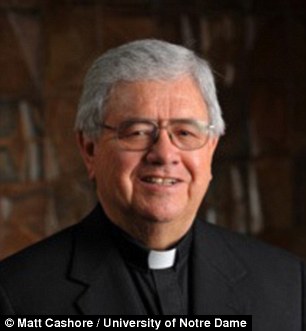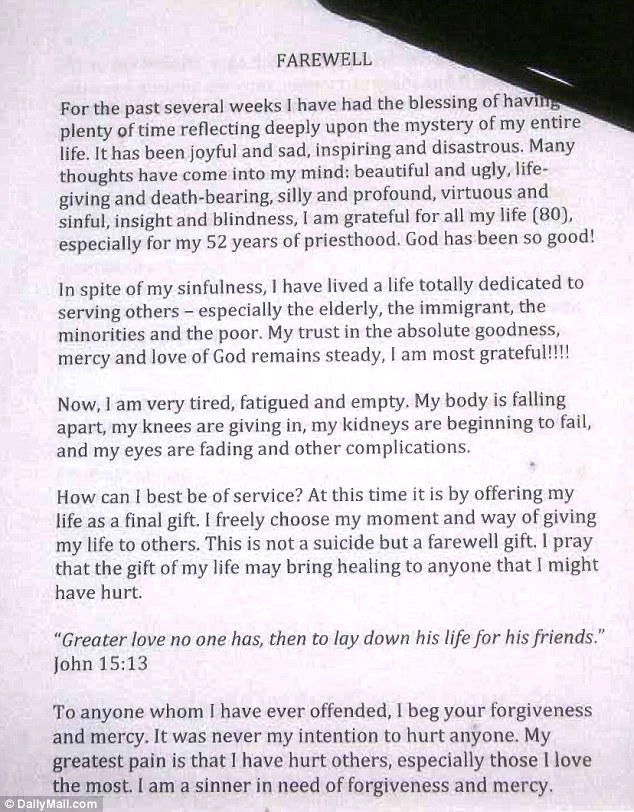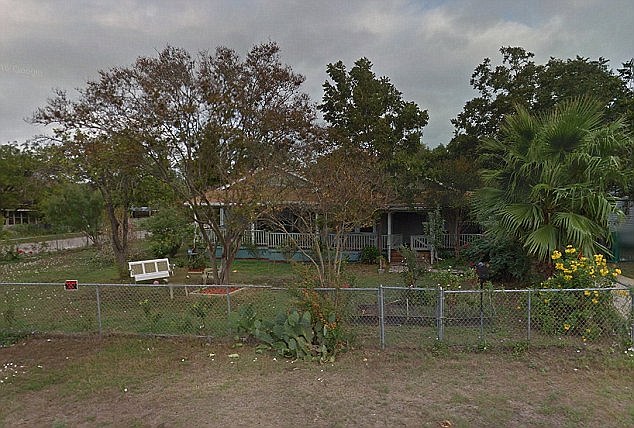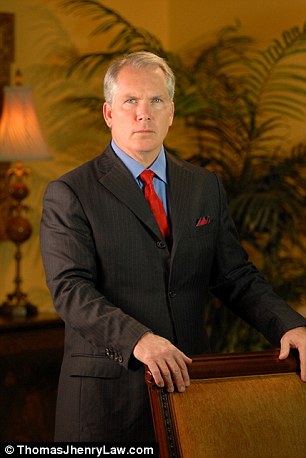The Final Insult - "Child Molester" Catholic Priest Who Committed Suicide to Evade Justice Said It Was a "Gift" to His Victims – after a Life "Serving Others"
By Emma Foster
A Catholic priest who shot himself in the head after he was accused of molesting a young boy left a chilling suicide note in which he claims he took his own life as 'a final gift' to anyone he 'might have hurt'. In the note - which appears to be a veiled admission of guilt - Father Virgilio Elizondo, 80, said he had lived a life 'totally dedicated to serving others'. The Notre Dame professor left it near where his body was found, at his San Antonio, Texas, home. Apparently unconcerned by the feelings of his alleged victim, he thanked God for his entire life - 'especially' his 52 years of priesthood - during which time his accuser claims Fr. Elizondo sexually assaulted him when he went to him to report abuse by another priest. The letter - obtained by Daily Mail Online - goes on to describe how Fr. Elizondo felt 'fatigued and empty' and was suffering various ailments affecting his kidneys, eyes and knees. Only in the last paragraph of the carefully typed-out note - discovered on a table just yards from where Fr. Elizondo committed suicide - does the priest 'beg forgiveness and mercy from those he has hurt or offended.' Last night the lawyer representing Fr. Elizondo's alleged victim called priest self-serving and manipulative. Attorney Thomas J. Henry told Daily Mail Online: 'His comments about hurting others that he has offended and wanting forgiveness really appears to be not a suicide note but an apology note for his conduct. 'I think that he takes accountability in a vague way and in a very odd way calls his suicide a farewell gift - a gift to anyone he may have hurt. 'But those statements are self-serving in the sense that a farewell gift in the face of hurting other people by killing yourself is not what we would think would be appropriate unless the severity of hurting others was so much you felt you had to do this. 'I think that he has taken a way out that is not responsible in the least with regards to addressing these allegations.
'In his position he should have willingly provided sworn testimony about his conduct over the course of time he was a priest. 'I don't think saying he took the easy way out is how I would characterize this as much as a manipulation to avoid answering serious questions.' Fr. Elizondo was found dead from a single self-inflicted gunshot wound inside his home on Monday, according to San Antonio police. The once respected religious leader and theologian had been embroiled in controversy since last May, when an orphan named only as John Doe filed a lawsuit in which he accused the aging cleric of molesting him when he went to him in 1983 to report sexual abuse by another priest named Father Jesus Armando Dominguez. Fr. Dominguez, who is currently a 'fugitive from justice' believed to be in Mexico, according to Henry, molested and performed sex acts on the boy for around two years from 1980 at a local orphanage. When Fr. Dominguez left the orphanage, the boy tried to report the abuse to Fr. Elizondo but instead of listening 'he began to fondle the Plaintiff's genitals, taking advantage of the same sexual liberties Plaintiff complained of with Father Dominguez,' according to the lawsuit. Although Fr. Elizondo denied the allegations when he was alive - his suicide note appears to suggest his guilt. In the 273 word letter - entitled 'Farewell' - which was found on a table just eight feet away from his body, the priest describes his life as being 'joyful and sad, inspiring and disastrous'. The note, which was obtained from law enforcement by Henry's law firm under subpoena, continues: 'Many thoughts have come into my mind: beautiful and ugly, life-giving and death-bearing, silly and profound, virtuous and sinful, insight and blindness, I am grateful for all my life, particularly for my 52 years of priesthood. God has been so good!' He adds: 'In spite of my sinfulness I have lived a life totally dedicated to serving others - especially the elderly, the immigrant, the minorities and the poor... Now I am very tired fatigued and empty. My body is falling apart, my knees are giving in, my kidneys are beginning to fail, and my eyes are fading and other complications.' Fr. Elizondo then asks how he could be 'best be of service?' before adding: 'At this time it is by offering my life as final gift. 'I freely choose my moment and way of giving my life to others. This is not a suicide but a farewell gift. 'I pray that the gift of my life may bring healing to anyone that I might have hurt.' He then quotes the words of Jesus: 'Greater love no one has, than to lay down his life for his friends. John 15:13' After begging for forgiveness from those he has 'offended' the priest claims it was never his intention to hurt anyone and ends the note: 'I am a sinner in need of forgiveness and mercy.' Henry believes the note was calculated and manipulative and thinks that the priest should have take accountability for his actions by testifying under oath.
He said: 'This is a person who was highly educated and for most of his adult life had learned how to deal with his audience so the manner and method of this suicide note - starting with farewell - is obviously constructed in such a way as to firstly, make Fr Elizondo appear to be asking for forgiveness for his sins and secondly when he claims to be giving up his life for this purpose - it is an inappropriate and manipulative use of words. 'Giving up your life is not a gift to any abused child, it's just a manipulation to avoid dealing with this issue. 'Child sexual abuse is a crime that can permanently ruin a person's life.' The lawyer said he is continuing the lawsuit against Fr. Elizondo's estate and has urged anybody else who may have been a victim of the priest to find the courage to come forward and report the abuse. Henry added: 'The lawsuit is still pending and we're going to be learning more about this priest's background and history as we obtain information from various priest files that we are requesting. 'Fr. Elizondo was working for the Catholic Church at the time this occurred decades ago and he continued to work at the Church until his death.
'So his death doesn't change the injury my client experienced or the effect on my client over his entire life. 'It is important to continue the lawsuit in the interests of justice for my client but also to provide justice to anyone else who could have been affected by this person. 'Any other people who were victim to this man need to come forward - which is difficult for them because of the damage they have sustained - but they need to come forward because that is the only way in which law enforcement and people in our society are able to connect the dots as to what the church knew, when they knew it, when these people made the complaints and how the church would have known and/ or concealed information. 'By coming forward victims help each other, they help create prevention and they help deter the bad conduct of people who have this proclivity to molest children.' Henry declined to discuss his client's feelings toward Fr. Elizando's death - or the contents of the suicide note - other that to say the priest's conduct had caused him 'endless problems over his life'. The lawsuit describes how the alleged victim has suffered years of mental illness, substance abuse and addictions, has been unable to hold down a job or relationship, and has even attempted suicide - all because of the abuse. The court document states: 'As Plaintiff got older, he was plagued with anger and severe depression, for which he sought therapeutic treatment and had to regularly take medication. 'On a few occasions, still haunted by the oddities in his past, Plaintiff has attempted suicide. 'His struggles with debilitating depression and thoughts of suicide still plague him today.' It adds: 'Plaintiff has often been unable to parent his children due to the need to be under the care of a mental health facility. 'Plaintiff has lost jobs and forfeited close relationships with his loved ones due to his mental status. 'Each year, these feelings have gotten progressively worse. Plaintiff suffers suffer from multiple forms of substance abuse and addictions.' The lawsuit also states that authority figures within the church were made aware of the abuse but covered it up until 2004, when a lawsuit was filed against Fr. Dominguez.
|
.
Any original material on these pages is copyright © BishopAccountability.org 2004. Reproduce freely with attribution.



